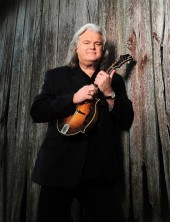Fourteen-time GRAMMY� Award-winner Ricky Skaggs’ career is easily among the most significant in recent country music history. If Skaggs’ burgeoning trophy case full of awards wasn’t already enough evidence of that fact, consider that legendary guitarist Chet Atkins once credited Skaggs with “single-handedly saving country music.” Not one to rest on his laurels, Ricky Skaggs is now actively defining and re-shaping the direction of another indigenous American genre of music – bluegrass. Born July 18, 1954 in Cordell, Kentucky, Skaggs showed signs of future stardom at an early age, playing mandolin on stage with bluegrass pioneer Bill Monroe at 5 and appearing on TV with Lester Flatt & Earl Scruggs at 7. He emerged as a professional bluegrass musician in 1971, when he and his friend Keith Whitley were invited to join the legendary Ralph Stanley’s band the Clinch Mountain Boys. Skaggs then went on to record and perform with progressive bluegrass acts like the Country Gentlemen and J.D. Crowe & the New South, whose self-titled 1975 Rounder Records debut album was instantly recognized as a landmark bluegrass achievement. He then led Boone Creek, which also featured Dobro ace and fellow New South alumnus Jerry Douglas. But Skaggs turned to the more mainstream country music genre in the late ‘70s when he joined Emmylou Harris’s Hot Band, replacing Rodney Crowell. He became a recording artist in his own right in 1981 when his Epic label debut album Waitin’ for the Sun to Shine topped the country charts and yielded a pair of 1 hits. Overall, his productive stay at Epic Records would result in a total of 12 1 hits. Additionally, he garnered eight Country Music Association Awards--including the coveted Entertainer of the Year trophy in 1985. Skaggs, of course, fit right in with young “new-traditionalist” ‘80s artists like Randy Travis, and helped rejuvenate the country music genre after the worn-out “Urban Cowboy” period. But, Skaggs put his own stamp on the country format by infusing his bluegrass and traditional country music roots into the contemporary Nashville sound. Skaggs’ 1997 album Bluegrass Rules!, released on his newly-formed Skaggs Family Records label, marked a triumphant return to bluegrass—which he’s solidified ever since with a series of GRAMMY� Award winning albums, recorded with his amazing bluegrass band, Kentucky Thunder (winners of the IBMA ‘Instrumental Group of the Year’ 6 out of the last 7 years). Skaggs’ has also served as a home for similar bluegrass and roots music-oriented artists including Cherryholmes, Cadillac Sky, and The Whites. Ricky Skaggs’ career, then, has virtually come around full circle from its traditional country music foundation to the commercial country mainstream and back again--thereby effectively foreshadowing the bluegrass music explosion fueled by the 2000 Coen Brothers film O Brother, Where Art Thou? and its celebrated soundtrack.
Ricky Skaggs is back with a full band sound, a style that made him one of the best-selling artists in Country history with an incredible string of 12 #1 Country hits and 12 Top 20 Country albums. His rousing and moving new album, Mosaic, will be released on August 24, 2010 through Skaggs Family Records and is a testament to his personal faith.
Skaggs worked closely with fellow GRAMMY winner Gordon Kennedy, known for his work with Eric Clapton, Garth Brooks and Bonnie Raitt, to create an album that mixes elements of Country music with Beatles-esque melodies and lyrics that speak to Skaggs’ faith, making “music that is in my head and in my heart,” says Skaggs.
With Mosaic, Skaggs takes his music in a new direction, reincorporating electric instruments, keyboards and drums. While the songs will resonate well with AC Radio, Skaggs hasn’t abandoned his acoustic, bluegrass roots and mixes a pop/rock/ country sound with strains of acoustic guitar, mandolin and fiddle.
The title track, “Mosaic,” signals all to realize that no matter how small we feel at times, we all have a unique place in life. “Someday Soon” opens with banjo and piano over a sturdy drum beat before kicking into a catchy chorus. Ethereal keys, hand drums, a 12-member choir and an electric guitar played by Peter Frampton, kick off album standout “My Cup Runneth Over,” while “Picture” has a lush sound accented by strings and a hammered dulcimer. And with a clever twist on the title, “Return to Sender” includes an orchestra as well as background vocals by Tommy Sims.
